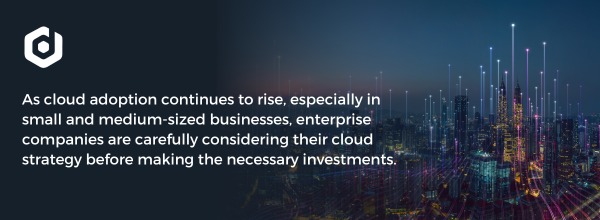As cloud adoption continues to rise, especially in small and medium-sized businesses, enterprise companies are carefully considering their cloud strategy before making the necessary investments. Many of them are deciding to opt for private cloud infrastructure rather than public cloud options. This prompts a question: “Why would enterprise companies choose private cloud over public cloud?”.
Security and Compliance
Enterprise companies need to comply with strict regulations regarding data privacy and security measures. Since public cloud providers share resources and data across many tenants, it is challenging to adhere to such regulations. Even more so when the workload or application involves highly sensitive data. On the other hand, using a private cloud means the company can tighten compliance with strict regulations, especially if experimenting with micro-segmenting of different workloads.
Customisation
The technological requirements of enterprise companies differ from SMBs, and this directly affects the customisation of infrastructure. Public cloud providers offer standardised cloud services while private cloud infrastructure allows for customising the infrastructure to meet specific business requirements. This flexibility enables companies to adopt a tailored cloud solution that aligns with the needs of their workloads and business objectives. Private cloud can also be cost-effective in terms of selecting and identifying the appropriate underlying hardware.
Performance
Enterprise companies demand constant availability and high-performance levels for their business-critical applications. Public cloud providers cannot always guarantee the required performance levels, especially during peak hours or network congestion. However, private clouds can deliver higher performance and availability levels since they cater to a single company network that can be customized to ensure optimal performance.
Control
Private cloud provides customers with more control over their data than a public cloud. As the infrastructure is tailored specifically for the company, it can provide more granular control over who has access to various applications, data, systems, and services. Controlling user access to different systems and data types is easier in private cloud environments since you can monitor and control who sees what, and at what time.
Although public cloud is an efficient solution for start-ups, small and medium-sized businesses, enterprise companies have a unique set of requirements in terms of security, compliance, customisation, performance, and control. Private cloud offers a tailored solution that allows for greater control over these aspects, and enterprises can fully exploit shared infrastructure as a service.
With JedAI, customers have the best of both worlds, offering a private cloud solution that can burst to public cloud when demand dictates – ensuring that enterprise companies can meet the demands of their business fully. Get in touch today to learn more!

